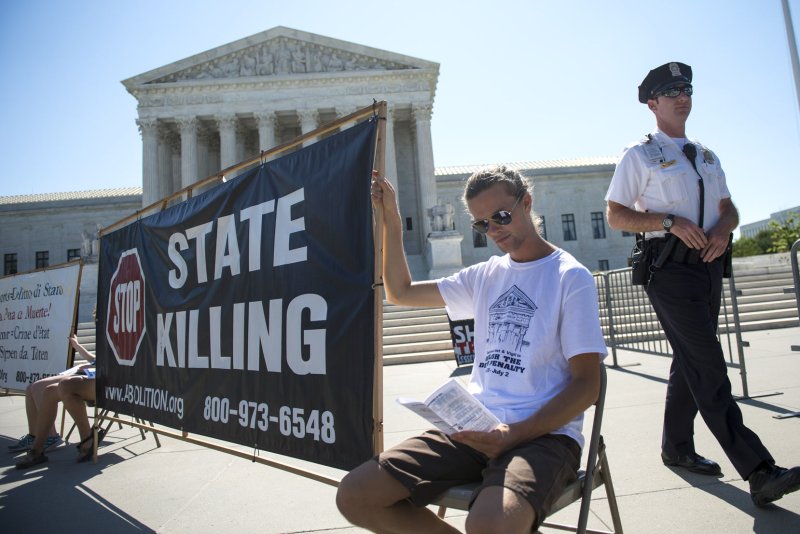1 of 4 | Death penalty opponents demonstrate outside of the U.S. Supreme Court on June 29, 2015 in Washington, D.C. The high court ruled on the controversial execution drug that was used in a botched execution, congressional redistricting and Environmental Protection Agency limits on the emission of mercury and other toxic pollutants from power plants. Photo by Kevin Dietsch/UPI. |
License Photo
WASHINGTON, June 29 (UPI) -- The Supreme Court on Monday upheld the use of midazolam in lethal injections, asserting it does not violate the Eighth Amendment barring "cruel and unusual punishment."
The court ruled in a 5-4 decision. Chief Justice John Roberts and Justices Antonin Scalia, Samuel Alito, Anthony Kennedy and Clarence Thomas voted in the majority, affirming a lower District Court decision.
"Our first ground for affirmance is based on petitioners' failure to satisfy their burden of establishing that any risk of harm was substantial when compared to a known and available alternative method of execution," Alito wrote in the majority decision. "We also affirm for a second reason: The District Court did not commit clear error when it found that midazolam is highly likely to render a person unable to feel pain during an execution."
"Finally, we find it appropriate to respond to the principal dissent's groundless suggestion that our decision is tantamount to allowing prisoners to be 'drawn and quartered, slowly tortured to death, or actually burned at the stake.' That is simply not true, and the principal dissent's resort to this outlandish rhetoric reveals the weakness of its legal arguments," Alito concluded.
Justices Ruth Bader Ginsburg, Stephen Breyer, Sonia Sotomayor and Justice Elena Kagan dissented.
In the court's dissent, Sotomayor alluded to a previous case, Roper v. Simmons, that stated "by protecting even those convicted of heinous crimes, the Eighth Amendment reaffirms the duty of the government to respect the dignity of all persons."
"Today, however, the Court absolves the State of Oklahoma of this duty. It does so by misconstruing and ignoring the record evidence regarding the constitutional insufficiency of midazolam as a sedative in a three-drug lethal injection cocktail, and by imposing a wholly unprecedented obligation on the condemned inmate to identify an available means for his or her own execution. The contortions necessary to save this particular lethal injection protocol are not worth the price," Sotomayor wrote.
The Supreme Court's decision in Glossip v. Gross needed to decide whether midazolam, an anti-anxiety drug and depressant, violated the Eighth Amendment to the U.S. Constitution, which bans "cruel and unusual punishments." It's the first time the Supreme Court has revisited the issue of lethal injection since 2008, when justices upheld the use of a three-drug lethal-injection cocktail.
The case is of particular importance because midazolam has become the last-chance execution drug for many states. Beginning in about 2008, the pharmaceutical companies that make thiopental and pentobarbital -- the first choice in execution drugs -- cut back their availability for executions. Some states have been getting the first-choice drugs from compounding pharmacies instead, but supplies are running short. If midazolam was found unconstitutional, states may have been forced to look to other methods of execution.
The argument centers on the botched execution of Clayton Lockett on April 29, 2014, in Oklahoma. Convicted of raping and murdering a 19-year-old woman in 2000, Lockett was administered midazolam instead of a barbiturate to induce a coma-like sleep. He survived for 43 minutes after the execution began. Since then, there have been other cases of botched executions using midazolam in Ohio and Arizona. However, Florida, the first to use midazolam in an execution, has used it many times without reports of adverse effects.
In 2014, Richard Glossip, a convicted murderer, and three other prisoners filed a lawsuit in Oklahoma to determine the constitutionality of midazolam, but it's likely the Supreme Court's decision will go beyond that.
According to the Death Penalty Information Center, 32 states have the death penalty. In March, Utah reauthorized the use of a firing squad if lethal injection is unavailable. In April, Oklahoma Gov. Mary Fallin authorized the use of nitrogen gas if lethal injection is struck down or the drugs are not available.
Amy R. Connolly contributed to this report.















